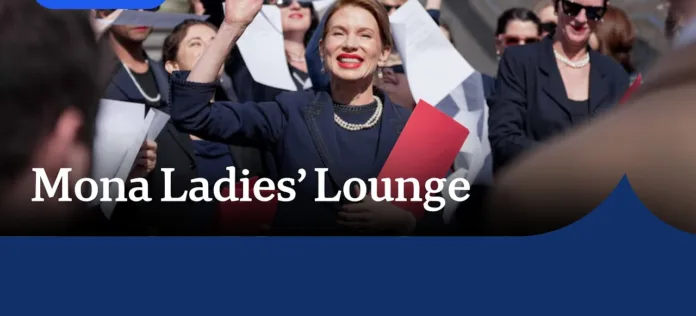Exclusive space for women receives legal support as court acknowledges ongoing gender inequality
In a landmark decision, Tasmania’s Supreme Court has quashed a tribunal ruling that would have forced Hobart’s Museum of Old and New Art (MONA) to admit men into its women-only “Ladies’ Lounge.” The court found that the lounge, created to provide women with a safe and exclusive space, was legally justified under Tasmania’s Anti-Discrimination Act, which allows programs promoting equal opportunity for disadvantaged groups.
The controversy began in March when Jason Lau, a New South Wales man, filed an anti-discrimination case against MONA after being denied entry to the lounge. Initially, the tribunal ruled in his favour, arguing that in modern society, women no longer face the same exclusion from spaces that they once did. The lounge, according to the tribunal, did not address a current issue of gender inequality.
However, in a pivotal decision, Acting Justice Shane Marshall reversed that ruling. The judge determined that MONA’s intention behind creating the lounge was to promote equal opportunity by giving women an exclusive environment where they could enjoy a “positive advantage.” Justice Marshall cited ongoing societal disadvantages, such as wage inequality and higher rates of sexual violence against women, as justification for the lounge’s existence.
Kirsha Kaechele, the artist behind the Ladies’ Lounge, hailed the verdict as a major victory for women. “In just 30 seconds, the patriarchy was smashed,” she said with enthusiasm. Following the court ruling, Kaechele and her supporters performed a symbolic dance on the courthouse steps, throwing papers and walking over them in celebration.
The court ruling emphasized that the lounge was not simply a relic of the past but a necessary space in today’s world, where women still face various forms of discrimination. Acting Justice Marshall stressed that while society has made progress, many challenges remain, particularly in areas like pay gaps, caregiving responsibilities, and safety concerns. By providing a women-only space, MONA’s lounge contributes to an ongoing fight for gender equality, the judge concluded.
The case now returns to the Tasmanian Civil and Administrative Tribunal (TASCAT) for reconsideration, but the Supreme Court’s ruling strongly suggests that women-only spaces like the Ladies’ Lounge are legally permissible. Kaechele promised future celebrations, saying, “Women will gather and celebrate this win, and there’s more to come.”
This case has sparked wider conversations about the role and legality of gender-exclusive spaces in today’s world, highlighting the tension between anti-discrimination laws and the need for safe, empowering environments for marginalized groups.
Analysis:
Political:
The Supreme Court’s ruling touches on the ongoing tension between anti-discrimination legislation and the practical application of equal opportunity programs. The decision in favor of MONA suggests that laws aimed at promoting equal opportunities can be interpreted to allow gender-specific spaces, as long as they address a documented disadvantage. Politically, this ruling could influence future legal cases and policy decisions surrounding gender-specific programs and whether they are essential to addressing inequality. It highlights the fine line between fighting discrimination and fostering environments where marginalized groups can feel safe and empowered. Politicians and lawmakers may now face pressure to clarify anti-discrimination laws and the limits of their application, especially as more challenges to women-only or men-only spaces emerge in various contexts.
Social:
Socially, the case highlights how women-only spaces continue to play a crucial role in counteracting gender-based exclusion and discrimination. The judgment acknowledges that, despite societal progress, many women still face inequalities in the workplace, in caregiving, and in safety concerns. These spaces allow women to escape the pressures of a male-dominated world and create an environment that prioritizes their comfort and safety. The ruling resonates with the broader feminist movement, which advocates for spaces where women can freely discuss, work, and connect without the burden of navigating a system often skewed against them. It also underscores ongoing societal debates over the role of exclusive spaces, not only for women but for other marginalized communities.
Racial:
Although the case specifically dealt with gender, it carries implications for racial equality as well. Both gender and race intersect in terms of discrimination and the need for exclusive spaces for minorities. Women of color, in particular, face both racial and gendered biases that compound their disadvantage. Spaces like the Ladies’ Lounge, while not explicitly racial, can become sanctuaries for women who experience layered forms of marginalization. The court’s ruling could encourage more discussions on the need for racially exclusive spaces or safe spaces for other minority groups facing intersectional discrimination. It speaks to the broader need for environments where marginalized individuals can engage without the fear of bias or exclusion.
Gender:
The ruling reinforces the idea that gender-based spaces serve a specific purpose in promoting equality. As Justice Marshall pointed out, women still face many disadvantages despite the progress made in gender equality. Whether through wage gaps, workplace discrimination, or the disproportionate burden of caregiving, women often find themselves at a societal disadvantage. The court’s decision validates the need for women to have spaces that allow them to connect and thrive without the presence of men. This ruling also stirs up debates about the fairness and necessity of men-only spaces, suggesting that while equality is the goal, there may still be a need for gender-segregated environments to foster genuine equity.
Economic:
Economically, the ruling could have far-reaching consequences for businesses and institutions that rely on exclusive spaces to attract specific demographics. Women-only environments like the Ladies’ Lounge may be seen as a selling point for attracting female patrons who feel safer and more comfortable in gender-segregated spaces. The court’s endorsement of such spaces as promoting equal opportunity could embolden other organizations to create similar environments. However, the ruling may also deter potential male customers or visitors who view these exclusive spaces as discriminatory against men, sparking a larger debate about how businesses can balance inclusivity with creating environments that serve disadvantaged groups.
